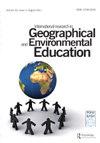书评:如果你今年只在平时的领域之外读了一本书……
IF 3.1
Q2 EDUCATION & EDUCATIONAL RESEARCH
International Research in Geographical and Environmental Education
Pub Date : 2021-09-29
DOI:10.1080/10382046.2021.1966210
引用次数: 0
摘要
鉴于斯蒂芬·霍金在《时间简史》(1988)中承认出版商警告说,书中每出现一个方程,读者人数就会减半,我担心这个标题可能会阻止《国际地理与环境教育研究》(IRGEE)的许多读者进一步探索帕帕迪米特里欧博士对空间复杂性的宏伟阐述。我写这篇评论的目的,是为了说服地理和环境教育工作者,他们可能是本刊的主要读者,即使他们对自己对复杂系统的理解缺乏信心,并且对任何超过E = MC2的公式都感到害怕,他们也会从中获得很多乐趣、兴奋和理解——即使他们接受了作者的邀请,把大部分数学留到以后。在本书开头的致谢中,帕帕迪米特里乌博士透露了一些似乎是什么让他在他的写作中出现了文艺复兴式的博学。他指的是他的祖父的影响“谁第一个教我算术和如何去爱数字之前我去学校”,他的祖母Filanthi(她的名字的意思是“花的朋友”),“谁指示我如何寻找隐藏的“花”(隐藏的好)在所有“困难”(我现在考虑回想起来,她的意思“复杂性”,他的父亲“谁先开始我在几何(空间)的挑战思维”和他的母亲“定位我,一次又一次,探索地理空间的奥秘"帕帕迪米特里乌博士进一步解释说,尽管他的母亲是一位古典主义者和历史学家,“她坚信空间是我们生活的终极统治者……而且,“虽然她总是鼓励我简化不必要的复杂,但她也教会了我将极端简单的枯燥复杂化的美学乐趣”。这些对作者自身思维过程早期影响的见解,有助于解释这本书如何帮助我们读者,更具体地说是教育工作者,重新想象地理对我们自己思维的范围和贡献,以及我们如何在未来指导学生的空间意识。在他的序言中,Papadimitriou博士试图回答五个关键问题:本文章由计算机程序翻译,如有差异,请以英文原文为准。
Book review: if you only read one book outside your normal area this year …
In view of Stephen Hawking’s acknowledgement in A Brief History of Time (1988) of the warning from his publisher that, for every equation in the book, the readership would be halved, I am concerned that the title may dissuade many readers of International Research in Geographical and Environmental Education (IRGEE) from exploring Dr Papadimitriou’s magnificent exposition of spatial complexity any further. My purpose in this review, is to persuade geographical and environmental educators, who presumably form the main readership of this journal, that even if they feel less than confident in their understanding of complex systems, and feel intimidated by any formula longer than E = MC2, they have much pleasure, excitement and understanding to gain – even if they accept the invitation of the author to leave much of the mathematics for later. In his Acknowledgements at the start of the book, Dr. Papadimitriou reveals a little of what appears to have led him to the Renaissance-like erudition that emerges throughout his writing. He refers to the influences of his grandfather “who first taught me arithmetic and how to love numbers long before I went to school”, his grandmother Filanthi (her name means “friend of flowers”), “who instructed me how to look for the hidden “flower” (the hidden good) in all “difficulties” (I now consider in retrospect that she meant “complexities”, his father “who first initiated me in the challenges of geometric (spatial) thinking” and his mother “for orienting me, time and again, towards the exploration of the mysteries of geographical space”. Dr Papadimitriou explains further that, although his mother was a classicist and historian, “she firmly believed that space is the ultimate ruler of our lives, ... and, “while she always prompted me to simplify the unnecessarily complex, she also taught me the aesthetic pleasures of complexifying the dullness of extreme simplicity”. Such insights into early influences on the author’s own thought processes go far to explain how this book can help us as readers, and more specifically educators, to re-imagine the scope and contribution of geography to our own thinking and how we may guide the spatial awareness of our students in the future. In his Preface, Dr Papadimitriou attempts to answer five key questions:
求助全文
通过发布文献求助,成功后即可免费获取论文全文。
去求助
来源期刊

International Research in Geographical and Environmental Education
EDUCATION & EDUCATIONAL RESEARCH-
CiteScore
5.20
自引率
33.30%
发文量
11
期刊介绍:
International Research in Geographical & Environmental Education publishes quality research studies within the context of geographical and environmental education. The journal endeavours to promote international interest and dissemination of research in the field, provides a forum for critique, and demonstrates the relevance of research studies to good professional practice.
 求助内容:
求助内容: 应助结果提醒方式:
应助结果提醒方式:


